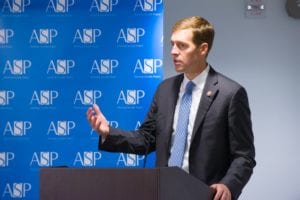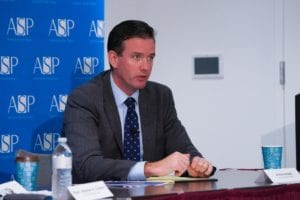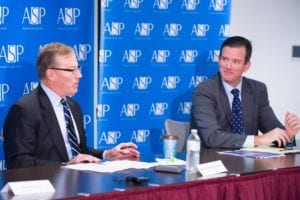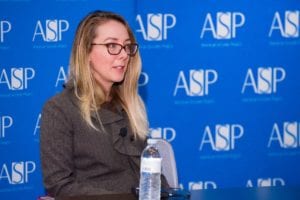Go offline with the Player FM app!
Event Recap: Battlefields of the Future: The Next Generation of Nuclear Reactors
Archived series ("Inactive feed" status)
When?
This feed was archived on April 13, 2022 05:44 (
Why? Inactive feed status. Our servers were unable to retrieve a valid podcast feed for a sustained period.
What now? You might be able to find a more up-to-date version using the search function. This series will no longer be checked for updates. If you believe this to be in error, please check if the publisher's feed link below is valid and contact support to request the feed be restored or if you have any other concerns about this.
Manage episode 244512731 series 1564375
The American Security Project hosted a public event on nuclear reactors and their strategic and tactical uses by the military. Congressman Conor Lamb (D-PA) provided introductory remarks. Caroline Cochran, COO of advanced nuclear company Oklo, joined a panel including ASP President BGen Stephen Cheney and ASP COO Andrew Holland.
 In his introductory remarks, Rep. Lamb discussed the importance of nuclear energy. He noted the first commercial nuclear reactor in the United States was in his district at Shippingport. He discussed Pennsylvania’s long history in energy production. He highlighted how nuclear energy can create a new industry, that would create jobs and provide affordable, clean energy. Nuclear energy provides 40 percent of the state’s energy.
In his introductory remarks, Rep. Lamb discussed the importance of nuclear energy. He noted the first commercial nuclear reactor in the United States was in his district at Shippingport. He discussed Pennsylvania’s long history in energy production. He highlighted how nuclear energy can create a new industry, that would create jobs and provide affordable, clean energy. Nuclear energy provides 40 percent of the state’s energy.
Presently though, he pointed out nuclear energy is facing challenges. The plant at Three Mile Island has closed, and the Beaver Valley plant is at risk. If nuclear power plants close, natural gas will replace them. Rep. Lamb said there’s a better way forward. He discussed the Nuclear Energy Leadership Act, which he cosponsors, as a means of moving toward the future.
ASP COO Andrew Holland discussed how nuclear and advanced nuclear energy are having something of a moment in Congress. He also mentioned how nuclear technology is changing, and he noted that tomorrow’s nuclear power will be different from the past. His discussion focused on a recently published report, “Perspective – Micro Nuclear Reactors” he wrote for the American Security Project on micro nuclear reactors and their potential role in meeting the military’s energy needs.
Holland portrayed energy as a force multiplier for the military. He said energy should be viewed as an “offset” in the parlance of the Pentagon. He observed the military is increasingly moving toward electric energy, but he pointed out this energy needs to come from somewhere. The military, however, is continuing to generate this electricity like it has in the past. He stated only nuclear energy has the potential to meet the needs of the military.
ASP President BGen Stephen Cheney responded to these comments by noting he viewed energy as an Achilles heel. During his service, he recalled, his number one concern was how he would be able to refuel. He pointed out carting around fossil fuels to military forces is a huge vulnerability. Soldiers are constantly put in danger to move this fuel around. In contrast to ground forces, nuclear power allows the Navy to go 20 years before it needs to refuel.
 He also highlighted how small modular nuclear reactors could improve things. Using these reactors, bases could reduce their carbon footprint and their reliance on local power grids. While the designs for these reactors exist, the funding for them lags. Like Holland, he mentioned that as things lean toward electric, nuclear power provides a way to power them.
He also highlighted how small modular nuclear reactors could improve things. Using these reactors, bases could reduce their carbon footprint and their reliance on local power grids. While the designs for these reactors exist, the funding for them lags. Like Holland, he mentioned that as things lean toward electric, nuclear power provides a way to power them.
Holland then discussed two different aspects of the energy problem the military faces. On the one hand, the military has a need for energy security that allows it assured access to reliable energy. On the other hand, the military also needs to have energy resilience. He mentioned how micro nuclear reactors capable of being moved in shipping containers are a good answer to these problems.
BGen Cheney discussed energy security in relation to the recent blackouts related to the wildfires in California. He noted other bases are in areas at risk for fires and mentioned that reliance on local power grids would leave these bases vulnerable. He mentioned micro reactors would enable bases to move away from relying on local power grids to operate. He stated we need small and reliable reactors to move away from this dependency.
 Oklo cofounder Caroline Cochran drew attention to the fact other countries are already operating micro nuclear reactors. She noted that in places like Siberia, micro nuclear reactors already provide energy to remote areas. In Alaska, however, reliance on fossil fuels is creating a situation where the journey to deliver fuel ends up burning more fuel than is delivered. In other areas, not even this option is available. She argued this energy poverty demonstrates there is a market and a need for micro nuclear reactors.
Oklo cofounder Caroline Cochran drew attention to the fact other countries are already operating micro nuclear reactors. She noted that in places like Siberia, micro nuclear reactors already provide energy to remote areas. In Alaska, however, reliance on fossil fuels is creating a situation where the journey to deliver fuel ends up burning more fuel than is delivered. In other areas, not even this option is available. She argued this energy poverty demonstrates there is a market and a need for micro nuclear reactors.
She mentioned that even in developed areas nuclear energy could provide cheaper and greener energy. She drew attention to the longevity of the fuel used by the reactors, which can last decades. She also addressed concerns about the safety of reactors by stating the inherent physical characteristics of the fuel her company uses keep it safe. In a time when we are realizing everything produces waste, she pointed out very limit waste is involved in reactors she discussed. The energy density of nuclear fuel used in the reactors is two million times denser than fossil fuels.
The post Event Recap: Battlefields of the Future: The Next Generation of Nuclear Reactors appeared first on American Security Project.
20 episodes
Archived series ("Inactive feed" status)
When?
This feed was archived on April 13, 2022 05:44 (
Why? Inactive feed status. Our servers were unable to retrieve a valid podcast feed for a sustained period.
What now? You might be able to find a more up-to-date version using the search function. This series will no longer be checked for updates. If you believe this to be in error, please check if the publisher's feed link below is valid and contact support to request the feed be restored or if you have any other concerns about this.
Manage episode 244512731 series 1564375
The American Security Project hosted a public event on nuclear reactors and their strategic and tactical uses by the military. Congressman Conor Lamb (D-PA) provided introductory remarks. Caroline Cochran, COO of advanced nuclear company Oklo, joined a panel including ASP President BGen Stephen Cheney and ASP COO Andrew Holland.
 In his introductory remarks, Rep. Lamb discussed the importance of nuclear energy. He noted the first commercial nuclear reactor in the United States was in his district at Shippingport. He discussed Pennsylvania’s long history in energy production. He highlighted how nuclear energy can create a new industry, that would create jobs and provide affordable, clean energy. Nuclear energy provides 40 percent of the state’s energy.
In his introductory remarks, Rep. Lamb discussed the importance of nuclear energy. He noted the first commercial nuclear reactor in the United States was in his district at Shippingport. He discussed Pennsylvania’s long history in energy production. He highlighted how nuclear energy can create a new industry, that would create jobs and provide affordable, clean energy. Nuclear energy provides 40 percent of the state’s energy.
Presently though, he pointed out nuclear energy is facing challenges. The plant at Three Mile Island has closed, and the Beaver Valley plant is at risk. If nuclear power plants close, natural gas will replace them. Rep. Lamb said there’s a better way forward. He discussed the Nuclear Energy Leadership Act, which he cosponsors, as a means of moving toward the future.
ASP COO Andrew Holland discussed how nuclear and advanced nuclear energy are having something of a moment in Congress. He also mentioned how nuclear technology is changing, and he noted that tomorrow’s nuclear power will be different from the past. His discussion focused on a recently published report, “Perspective – Micro Nuclear Reactors” he wrote for the American Security Project on micro nuclear reactors and their potential role in meeting the military’s energy needs.
Holland portrayed energy as a force multiplier for the military. He said energy should be viewed as an “offset” in the parlance of the Pentagon. He observed the military is increasingly moving toward electric energy, but he pointed out this energy needs to come from somewhere. The military, however, is continuing to generate this electricity like it has in the past. He stated only nuclear energy has the potential to meet the needs of the military.
ASP President BGen Stephen Cheney responded to these comments by noting he viewed energy as an Achilles heel. During his service, he recalled, his number one concern was how he would be able to refuel. He pointed out carting around fossil fuels to military forces is a huge vulnerability. Soldiers are constantly put in danger to move this fuel around. In contrast to ground forces, nuclear power allows the Navy to go 20 years before it needs to refuel.
 He also highlighted how small modular nuclear reactors could improve things. Using these reactors, bases could reduce their carbon footprint and their reliance on local power grids. While the designs for these reactors exist, the funding for them lags. Like Holland, he mentioned that as things lean toward electric, nuclear power provides a way to power them.
He also highlighted how small modular nuclear reactors could improve things. Using these reactors, bases could reduce their carbon footprint and their reliance on local power grids. While the designs for these reactors exist, the funding for them lags. Like Holland, he mentioned that as things lean toward electric, nuclear power provides a way to power them.
Holland then discussed two different aspects of the energy problem the military faces. On the one hand, the military has a need for energy security that allows it assured access to reliable energy. On the other hand, the military also needs to have energy resilience. He mentioned how micro nuclear reactors capable of being moved in shipping containers are a good answer to these problems.
BGen Cheney discussed energy security in relation to the recent blackouts related to the wildfires in California. He noted other bases are in areas at risk for fires and mentioned that reliance on local power grids would leave these bases vulnerable. He mentioned micro reactors would enable bases to move away from relying on local power grids to operate. He stated we need small and reliable reactors to move away from this dependency.
 Oklo cofounder Caroline Cochran drew attention to the fact other countries are already operating micro nuclear reactors. She noted that in places like Siberia, micro nuclear reactors already provide energy to remote areas. In Alaska, however, reliance on fossil fuels is creating a situation where the journey to deliver fuel ends up burning more fuel than is delivered. In other areas, not even this option is available. She argued this energy poverty demonstrates there is a market and a need for micro nuclear reactors.
Oklo cofounder Caroline Cochran drew attention to the fact other countries are already operating micro nuclear reactors. She noted that in places like Siberia, micro nuclear reactors already provide energy to remote areas. In Alaska, however, reliance on fossil fuels is creating a situation where the journey to deliver fuel ends up burning more fuel than is delivered. In other areas, not even this option is available. She argued this energy poverty demonstrates there is a market and a need for micro nuclear reactors.
She mentioned that even in developed areas nuclear energy could provide cheaper and greener energy. She drew attention to the longevity of the fuel used by the reactors, which can last decades. She also addressed concerns about the safety of reactors by stating the inherent physical characteristics of the fuel her company uses keep it safe. In a time when we are realizing everything produces waste, she pointed out very limit waste is involved in reactors she discussed. The energy density of nuclear fuel used in the reactors is two million times denser than fossil fuels.
The post Event Recap: Battlefields of the Future: The Next Generation of Nuclear Reactors appeared first on American Security Project.
20 episodes
All episodes
×Welcome to Player FM!
Player FM is scanning the web for high-quality podcasts for you to enjoy right now. It's the best podcast app and works on Android, iPhone, and the web. Signup to sync subscriptions across devices.




